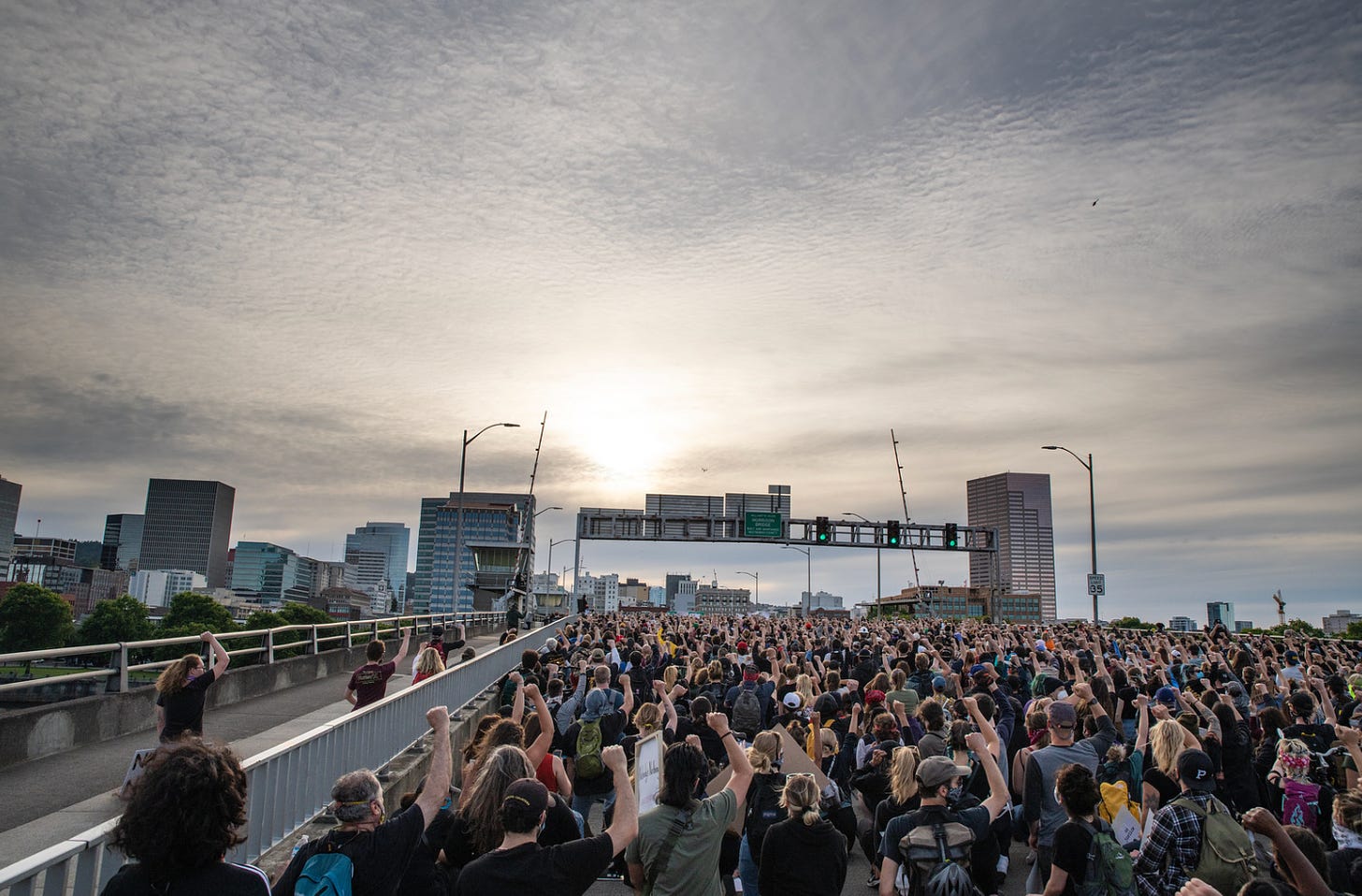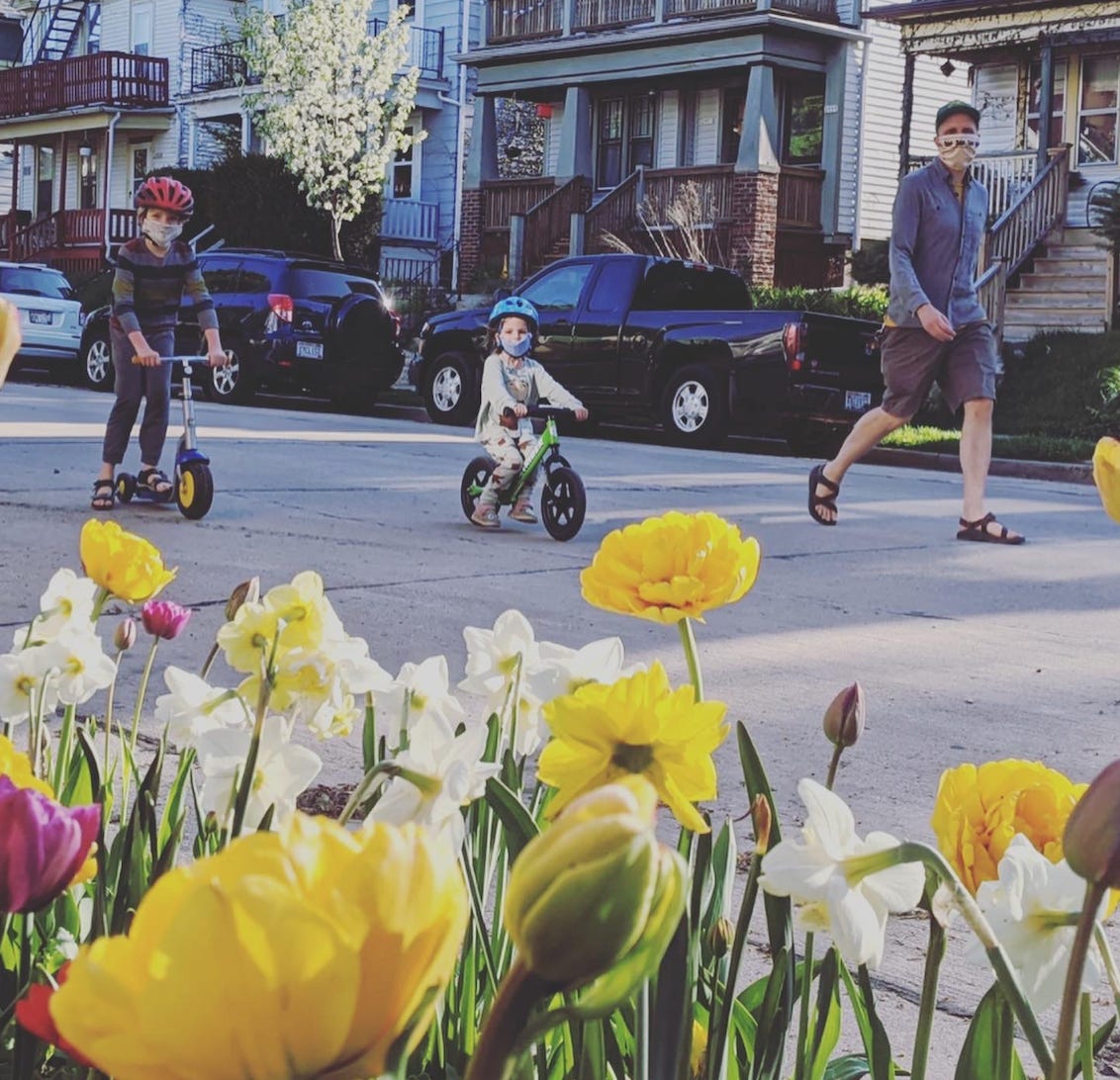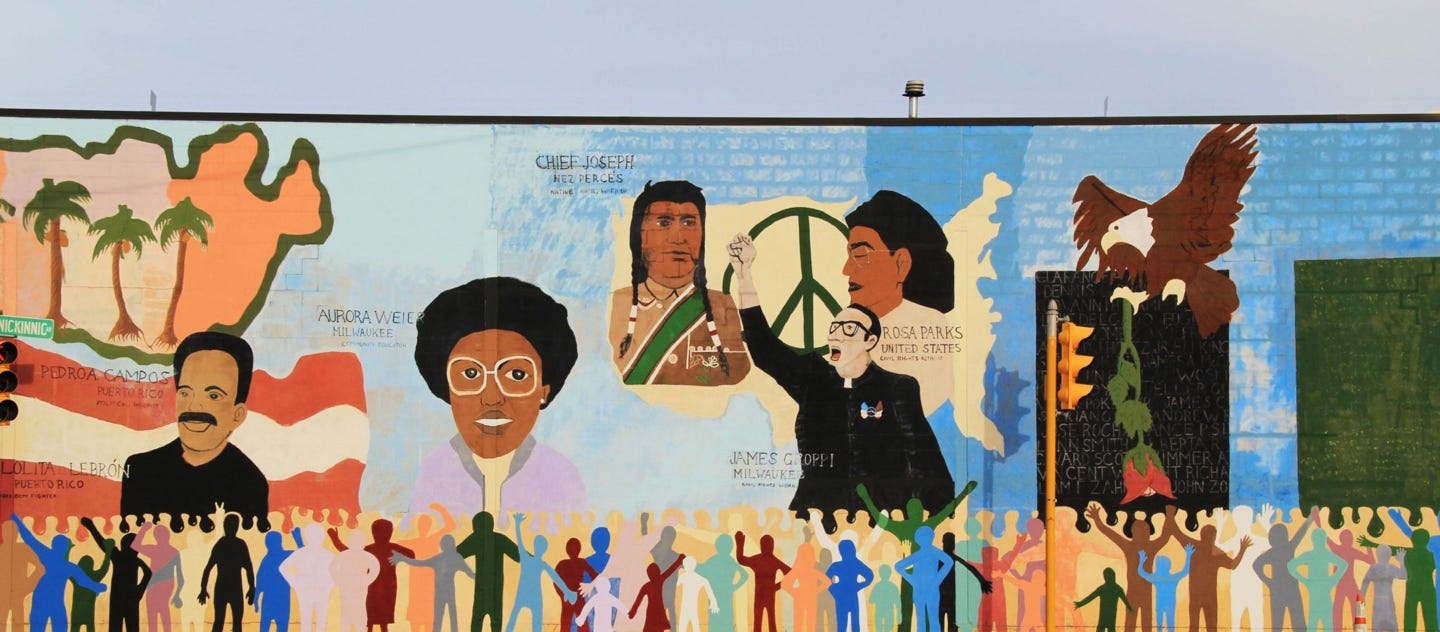Don't apologize for the moments when you cared a little bit more
On the summer of 2020 and the false absolution of judgment and projection
Top notes:
As I mentioned last week, I’m having sinus surgery this morning. I’m very lucky to have never had surgery before, but that means I’m experiencing the medical version of first day of school anxiety. It also means that I might be slower than normal in replying to comments and emails (or maybe not! perhaps I’ll feel great!). I’ll also be playing tomorrow’s weekly community discussion by ear.
This is an essay about being grateful for each other’s efforts (rather than being judgmental jerks to one another). If this space has been useful for you, thanks in advance for sending it to friends, passing on kind words, and becoming a paid subscriber. That always matters, but especially on a day when I’m giving way too much of my money to the American healthcare system.

Thursday will be the third anniversary of George Floyd’s death. I don’t think that there will be too many commemorations. As a society, we really only recognize shared anniversaries that fall on the fives and tens. That’s fine, I suppose. But even if that weren't the case, so many of us are still reticent to relive anything about 2020; it is as if we all decided to pretend as though that collective fever dream of a year never happened. What a fascinating response to collective trauma and grief: likely not very healthy, but understandable.
To the extent that the anniversary will be commemorated, it will probably be in the same manner as last year’s second anniversary. There will be a few articles bemoaning how little we have actually rectified the sins of racial capitalism. You will glide by them and feel some combination of hopelessness and self-satisfaction. “It’s like I’ve been saying” you might say to yourself, “it was all just performative.”
When I hear left-leaning White people talk about the summer of 2020, it’s often to poke fun at what other White people did or didn’t do. Can you believe that the Congressional Democrats kneeled while wearing kente cloth? What about all those union-busting corporations with their empty promises to spend billions of dollars fighting for racial justice? Or your most annoying, self-righteous friend, the one who was always yelling about ACAB and how they were going to “burn it all down” but then got a promotion at work and suddenly shut up? So many White people to mock and criticize! We haven’t even brought up the thing about the black squares on Instagram!
We are so unkind to each other, us left-leaning White people. I assume we are not the only group that is so inwardly ungenerous. It’s just that I understand the contours of our lack of generosity with a bone-deep intimacy. I wear our collective unkindness in my soul in the same way that I wear the wrinkles under my eyes.
We judge so loudly, and so constantly. We judge each other for being either too focused or not focused enough on the White working class. We sneer at each other for caring either too much or too little about electoral politics. We critique one another for being either moderate sell-outs or unrealistic radicals.
There was a period of time when we judged each other for forgetting a land acknowledgment; two months later, we were rolling our eyes whenever we heard an earnest voice share that they were speaking to us from the “unceded lands of…” For years, having read a book by Robin DiAngelo was proof in certain circles of your anti-racist bonafides; seemingly overnight, owning a copy of White Fragility became a punchline at best and a scarlet letter at worse (even though nothing had changed about the content of those books or DiAngelo’s broader message).
This isn’t to say that all White progressive actions are equally helpful, or that political movements shouldn’t be self-critical. The category of “progressive-leaning White people” spans a wide range of economic classes, genders, sexual orientations and abilities, to say nothing of ideologies. Unearthing power dynamics, debating strategy, learning out loud how to make political spaces more effective and welcoming— those are all crucial conversations.
But that’s never all that we’re doing when we critique and mock one another for being performative or cringe-y. We’re not building stronger movements. We’re just being grabbier crabs in the big White crab basket.

You’ll notice that I’ve been saying “we” here, which of course is a pretty slick rhetorical safety net. “We” sounds reflective while actually being accusatory. “We” is a good stand-in when I want to say “you all.” Let’s remove the false security of plural pronouns for a second, as well as the ego-gratification of the past tense. You know why I am so quick to judge other progressive White people? A lot of reasons. Some of it has to do with the fact that I’m not just a White person generally, but a cis White guy. I’ve spent the better part of a lifetime of assuming that I get to be the smartest person in every room. Of course I’m apt to default towards know-it-all-dom.
But that’s not all of it.
Like a lot of us, I don’t actually think about my Whiteness twenty four hours a day. That’s one of the most basic truisms of Whiteness, that we get the privilege of presumed default-ness. I notice my Whiteness at the specific moments when the stain of it (either in my own life or our collective lives) becomes temporarily impossible to ignore. I notice it when news of a cop killing an unarmed Black guy dominates the headlines. I notice it when a Republican Presidential candidate goes on a blubbery, tomato-faced rant about wokeness and a crowd that looks like me eats it up. I notice it when I’m in a room with mostly White people and just a few people of color (though almost never if I’m in a room with only White people). I notice it at the moment when somebody personally tells me that I did something racist. I notice it when I am directly asked to consider somebody else’s Blackness or Brownness.
It follows, then, that if Whiteness (mine and ours) is something that I only think about at these acute crisis moments, I will instinctually recoil from those recognition scenes. If I am only noticing Whiteness as badness, every ounce of my being must be galvanized to scrape that stain off of me. It does my ego no favors, in that moment, to think about how Whiteness itself might be transformed. What instant comfort does doing so offer me? Instead, my goal is to build as much spiritual separation from other White people as quickly as possible, to distinguish myself from the crowd. It’s the opposite of “if you can’t beat ‘em, join ‘em.” If ignoring my Whiteness is no longer an option, then I want to run away from everything and everybody that I perceive as White.
Or more precisely, I don’t actually want to run away— definitely not from the trappings and privileges of Whiteness. What I want is to appear (to myself, to other White people and most importantly, towards an idealized group of imagined Black and Brown onlookers) to be running away.
For most of my life, this magic trick was incredibly easy. If most White people were claiming to be “good” and “color-blind,” I could distinguish myself solely by pointing out that “actually *ahem* I knew that I was racist and that I was on a ‘lifetime path to unlearning my racism.’ ” What a fancy, faux-humble way to declare my exceptionalism. I could talk about “elevating Black women’s voices” and “diversifying my networks.” I could march in anti-police-brutality protests and type up righteous social media screeds about how “I can’t help but notice that [in the wake of _____ public Black tragedy] people of color are in mourning and White people are posting about their vacations.” I could learn to wait until a not-officially-tragic-day to post about my own vacation.
One of the many things that happened in 2020 was that— for a few months, at least— that trick didn’t work any more. The willingness to mouth the words “Black Lives Matter” was no longer a meaningful distinguisher between White people. Millions were saying it! Corporations were saying it! Mitt Freaking Romney was saying it! Neither was marching in the street nor buying books by Black authors nor pointing out the Whiteness of various spaces.
Now, if our collective goal had been to build a political movement that advanced racial, economic and social justice for all, that should have been exciting news! More people! Especially White people! Openly doing something that they weren’t doing just a few months prior! We would have thought about how to capture and transform all of that collective energy. We would have obsessed over building and supporting institutions to keep folks in the fight. We would have learned and grown more radical together as a community. Not everybody would have stuck with it, and that would have been okay (we’d likely shed no tears for losing Mitt along the way). But we’d at least have tried to move forward together.
To their credit, there were groups and individuals who did their best to do exactly that in 2020. I’ve been legitimately impressed, for example, with how the Showing Up For Racial Justice network, at least on a national level, channeled a sudden influx of members into a focus on base-building and rural working class organizing. Across the country, small scale mutual aid projects, labor unions, abolitionist prison pen-pal collectives and anti-authoritarian organizing efforts that were born in 2020 have continued to bloom and grow in slow, quiet, beautiful ways.
But for every person whom I encountered that summer who was concerned about rolling out a welcome mat, I saw far more White people erect walls between themselves and all of these new earnest White marchers and statement makers. Some sought distinction through their own rapid radicalization (which isn’t a problem in and of itself, as long as the goal is learning and growing with others rather than yelling “I”m an abolitionist/communist now and the sell-out corporate liberals will be first to the guillotine!”). Others became more symbolically strident in their rhetoric, hoping that the mere addition of four-letter-words to their pastel Instagram stories could serve as a stand-in for meaningful political action. Still others took shelter in the easy fortress of sarcasm and mockery, shooting easy targets like so many cringe-y fish in so many ”’bodies and spaces” barrels.
On the other side, many moderate and conservative White Americans witnessed that summer of temporary collective action, felt just as uncomfortable by it all (albeit for slightly different reasons), and made a choice as to whether to join or separate themselves from the “Black Lives Matter” chanting masses.
As is always the case in moments of temporary American racial progress, reactionary conservative organizers were more than ready to welcome those folks in— to remind them that all of this racism talk wasn’t actually their problem. That’s because the conservative movement has never been about spiritual absolution; they understand that politics is a game of first seizing and then utilizing the levers of power to advance their agenda. And that’s exactly what they did. It should come as no surprise, then, that one summer after we marched in the streets, the news cameras were no longer trained on “defund the police” placards, but instead on anti-CRT school board protests and press releases from Walgreens about how they were too scared to operate stores in a now-lawless San Francisco.
I’ve recently been re-reading my own writing from those heady months in the summer of 2020. I’m proud of some but not all of it. I’m embarrassed by the typos and convoluted sentences that reveal now much of it was hurriedly dashed off in the middle of the night (I was taking care of my kids during the day! I shouldn’t be embarrassed that child care duties had a meaningful impact on my writing, but I am! More internalized patriarchy, I think!). It’s not just the typos, though. I’m embarrassed by how nakedly self-conscious so much of it is. My prose was guarded and emotionally constipated. I cared so much about saying exactly the right thing, lest I become the next White person who might be publicly criticized.
But if I’m gentle with myself, I look back at both what I wrote and how I acted in the summer of 2020 and I see somebody who was truly trying to break out of those cycles of separation from other White people. There was some unnecessary snark and a few too many assumptions, but there’s also the first glimpse of an outreached hand. That was the summer that I first started offering organizing trainings, the summer that my life became more intimately connected to other White people’s efforts to transform their own communities, the summer I started caring a bit less about standing out from the crowd.
I have a lot of regrets about what I didn’t do in the summer of 2020— about how, if I had reached out sooner or been more practically minded, I could have built an even more vibrant community of White people working for a kinder world. But the part of me that tries to learn only through shame and regret is no more useful than the part of me that seeks absolution through judgment and projection.
Of course there’s so much more for me to do! The world is so far from where it needs to be. That’s true for all of you as well. Whatever you did in the summer of 2020— whether you were on the sidelines or on the streets, whether you were running a mutual aid coalition or if you spent hours finessing a hollow corporate statement for an employer whom you didn’t love but that paid the bills— it wasn’t enough. If it was, we would be living in a different reality right now.
That can all be true. But if you did anything in the name of justice that summer— from marching to reading, from getting into an argument to knocking on a door, from making a list of actions to actually taking those actions— don’t judge yourself for caring. Don’t assume that a present tense performance of shame and embarrassment— either internalized or projected onto others— moves us any further towards beloved community.
You very well may have been spurred to clumsy action because of ulterior motives. Okay then. That was your first step. What would it look like to be more thoughtful about your motivations next time? You may very well have made a lot of bold commitments, only to push them aside when post-quarantine life opened up. Again, okay. What support would you need to take it a step further? You may have even taken an action that you now fear has caused more harm than good. That happens. What have you learned from it— both from the kindness of your original intention and from the pain that it caused?
If my main regret from 2020 is that I didn’t welcome enough White people into this work, then the worst thing I could do is to once again mistake the opiate of judgement for the discipline of loving critique. Collectively, we didn't do enough three years ago. Some of what we did wasn’t helpful. But many more of us tried. And that’s beautiful, too.
The part of me that looks back on 2020 and wants to judge the actions you did or didn’t take doesn’t actually love justice. Neither does the part of me that seeks absolution through self-flagellation.
Sometimes the cynical, critical viewpoint isn’t the wisest, nor the most honest.
Because to be perfectly honest, here’s how I remember 2020:
I’m so glad we tried. I’d like us to keep trying. I‘d very much like us to never stop trying.
End notes:
Song of the week:
You know what the kids and I were listening to on repeat in the summer of 2020? “Alla drömmar är uppfyllda” by the regionally beloved Swedish alt-rock lifer Håkan Hellström. I’m pretty sure it’s about an aging pop star reflecting on a life in the game, but my Swedish isn’t great, so that summer it became a placeholder for whatever vague feeling of uplift I needed in the moment. The title helps (it translates to “All Dreams Come True”), as does the classic rock samples and the fact that its video is officially Quite Fun. I just gave it another listen and you know what? It holds up! How's that for looking back at the summer of 2020 with generosity?





"The part of me that tries to learn only through shame and regret is no more useful than the part of me that seeks absolution through judgment and projection." GOLD. Thank you, Bucks.
Thank you, Garrett. This is a great reminder to be kind to yourself and others. I, too, have wrinkles in my eyes and complicated layers of white guilt and finger pointing tendencies.